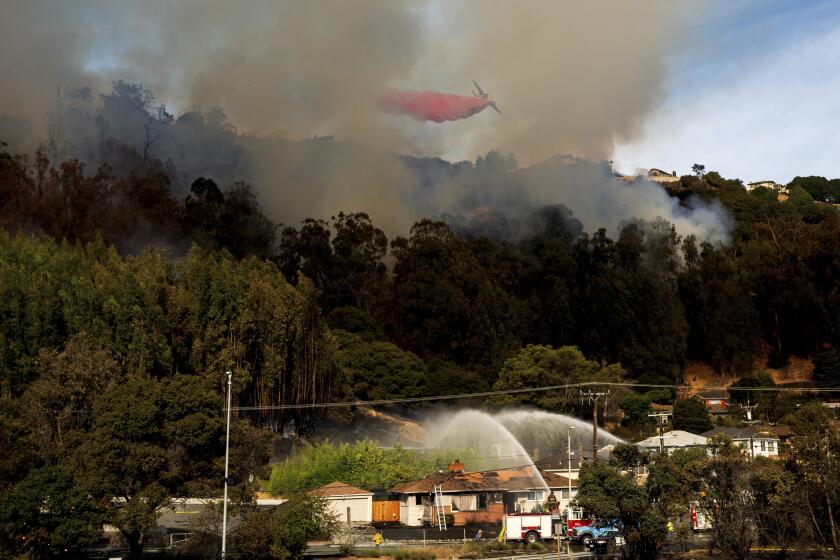Car Makers Lose Ruling on Prop. 213
Proposition 213 prohibits uninsured drivers from collecting broad damages from other motorists, but does not shield car manufacturers, the California Supreme Court ruled Monday.
Monday’s unanimous decision, which could affect thousands of cases, stemmed from a 1995 accident near San Jose in which a 1967 Ford Mustang driven by Benjamin Hodges was rear-ended, causing the gas tank to explode and leaving Hodges severely burned.
The high court overturned a 1997 decision by a San Jose trial court judge who ruled that Hodges was not entitled to seek punitive damages from Ford because of Proposition 213, the 1996 ballot measure that limits lawsuits by uninsured motorists and drunk drivers who are injured in auto accidents.
About 23% of the accidents on California’s roads involve uninsured motorists, according to Hodges’ attorney.
At least one other judge, in Orange County, had made the same ruling as the one in San Jose, and several other motions on the issue have been on hold in state trial courts pending the outcome of the Supreme Court decision, said San Francisco attorney Robin B. Johansen, who is affiliated with the Consumer Attorneys of California, a plaintiffs’ lawyers organization.
An unusually broad coalition ranging from Ralph Nader’s Center for Auto Safety to California Insurance Commissioner Chuck Quackenbush, who was one of the prime backers of Proposition 213, had urged the justices to reverse the lower court ruling. Two large auto manufacturers’ associations weighed in on Ford’s behalf.
Proposition 213, which passed handily, bars uninsured motorists from recovering noneconomic damages--such as compensation for pain and suffering and disfigurement, as well as punitive damages--from other motorists. The law allows the uninsured to recover economic damages, such as direct medical costs and loss of wages.
The statute was designed to protect law-abiding motorists who paid into the state’s car insurance pool--not to insulate manufacturers of defective cars, the justices emphasized in their ruling.
“The right to recover fully for an injury caused by a design defect, even by an uninsured motorist, has no bearing on any principle of fairness having to do with the financial responsibility laws,” Justice Stanley Mosk wrote for the court.
“The express goal of the initiative . . . was restoring balance to the system, not simple retribution. Its stated purposes of punishing illegal behavior and encouraging personal responsibility are emphatically directed at ‘reform[ing] an unfair system’ with respect to law-abiding drivers ‘who pick up the tab,’ ” Mosk wrote, quoting from campaign literature backing the initiative.
“There is no suggestion,” he added, that the law was intended “to benefit manufacturers of defective vehicles.”
If Ford’s position had prevailed, it would have substantially impaired the beneficial purposes of product liability law, said Washington attorney Brian Wolfman, who submitted a brief on behalf of the Center for Auto Safety. Wolfman noted that a detailed 1992 study showed that corporations generally take significant safety steps in the wake of substantial punitive damage awards.
Monday’s decision means that the Hodges case will be sent back to San Jose for a trial. Hodges, 17 at the time of the accident, was driving a car that he borrowed from a friend. Neither he nor the friend had car insurance. The car stalled on the freeway and was not moving at the time he was hit by a car going 65 mph.
Hodges’ attorney, David S. Rand, said his client has had numerous operations in an attempt to heal burns, leading to nearly $500,000 in medical expenses.
Ford has been sued more than 70 times by people burned after rear-end collisions in classic Mustangs--those built between 1964 and 1970. Plaintiffs’ lawyers said most of the suits have been settled out of court. Ford said it has no detailed figures on the outcomes of the suits.
Critics of the car maker, such as Clarence Ditlow of the Center for Auto Safety, say that the Mustang gas tank, the top of which is the floor of the car trunk, is “a classic design defect.” Ditlow and others maintain that the fact that there is no metal barrier, only a flimsy rear seat, between the gas tank and the passengers leaves car occupants vulnerable to fire when gas spews after a rear-end collision.
Federal authorities conducted a seven-year probe of the car before concluding in 1976 that the Mustang tanks “present no fire hazard which does not exist in other fuel tank systems.”
Ford abandoned the so-called “drop in gas tank,” which made the car lighter and less expensive to make, in 1971.
Despite the safety controversy, there are estimated to be about 1.5 million classic Mustangs still on the road, a testament to the car’s popularity. Ford has consistently argued that the car is not unsafe. Noting that Hodges was driving a 1967 Mustang, Cain said, “To suggest that a car that old is defective because its fuel system couldn’t withstand an impact of that magnitude [65 mph] is crazy.”
More to Read
Sign up for Essential California
The most important California stories and recommendations in your inbox every morning.
You may occasionally receive promotional content from the Los Angeles Times.










